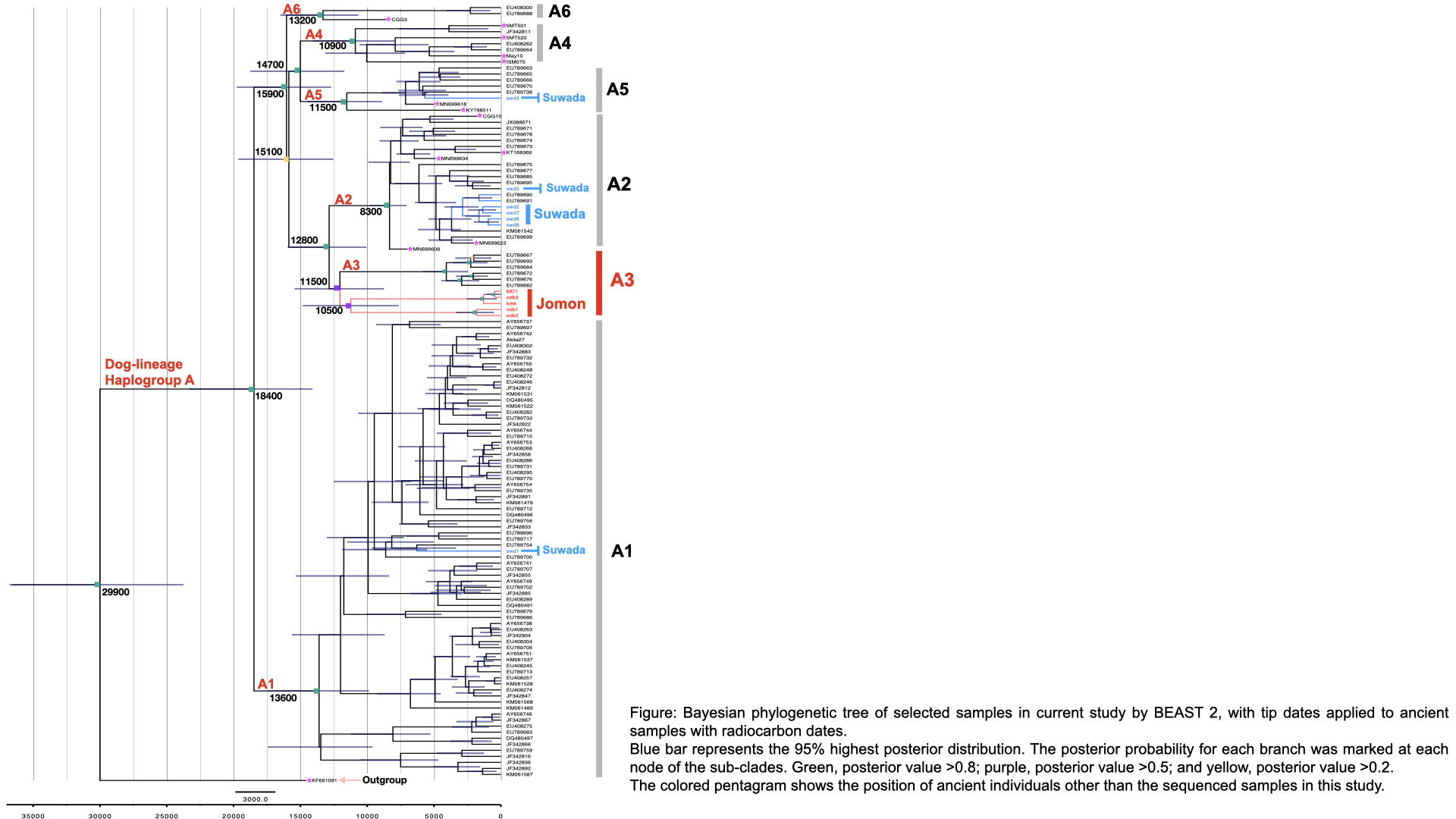2023.11.10
Archaeogenetical study of domestic dog in East Asia
SOKENDAI研究派遣プログラム 採択年度: 2022
XIAYIRE XIAOKAITI

Bayesian phylogenetic tree of selected samples by BEAST 2, with tip dates applied to ancient samples with radiocarbon dates. Blue bar represents the 95% highest posterior distribution. The colored pentagram shows the position of ancient individuals other than the sequenced samples in current study.
For my dissertation research, I would like to explore the evolutionary history of domestic dog, because dog was the only animal domesticated by hunter-gatherers before Neolithic Period, and established close relationships with humans. The world-wide spread of dogs took place in accordance with that of humans. However, the origin of the dog is still not fully understood. My research aims to reveal the origin and early stages of dog evolution by genomic analysis of ancient DNA (aDNA) preserved in dog remains from different periods in East Asia. Analysis of aDNA is a particularly powerful tool in understanding the evolutionary history of the species, as it has been well recognized by the recent Nobel Prize awarded to a pioneer in the field of human aDNA research.
Ancient East Asian dogs have not been extensively studied so far, and genome analysis of the extinct Japanese wolf suggests that eastern Eurasia was the most probable location for dog domestication (Gojobori et al., 2021). Therefore, I aim to apply aDNA approach on ancient dogs in East Asia.
The oldest dog found in China dates back to 10,000 years ago. Dogs were introduced to Japan in the Jomon Period around 9,300 years ago and had retained the morphological characteristics of the old domestic dogs for about 7,000 years, due to their geographical isolation in the Japanese Archipelago. Thus, I focused on the aDNA analysis of the Jomon dogs to obtain information on the initial evolutionary steps of dogs, which ultimately would help to reconstruct the population history of dogs all over the world and furthering our understanding of human activities and their relationship to the dogs in the past.
The purpose of applying for this SOKENDAI dispatch program is to analysis contemporaneous dog remains in China through collaborative work. Through analyzing Jomon dogs along with the dogs from Chinese archaeological sites (which might be the origin of canines in the Jomon period) to have a better understanding of domestication history of dogs in East Asia.
To reveal the genetic relationship of mtDNA of ancient Japanese dogs with that of other dogs, we constructed phylogenetic tree analyses. Our results showed that sequences from the Jomon dogs formed a monophyletic group (Jomon sub-clade), and this group was a sister clade to the A3 sub-clade, which consists of sequences from South Chinese dogs and one dog from Thailand. And that theJomon dog mtDNAs diverged from A3 (~11,500 years ago) soon after the A2 and A3 divergence (~12,800 years ago), indicating early divergence of the Jomon dogs’ sub-clade (Figure attached). These genetic analyses combined with archaeological evidence suggested that the Jomon dogs were possibly introduced into the Japanese archipelago 11,500–9,300 years ago (Xiaokaiti et al., 2023; accepted 17th-Jun, Anthropological Science).
Our results demonstrated the ancient genetic characteristics of Jomon dogs and provided novel information on the early stage of dog mtDNA history in East Asia.
派遣先滞在期間
Date of Departure: 2022/8/3
Date of Return: 2022/10/27
国、都市等
Beijing, China
機関名、受入先、会議名等
The Institute of Archaeology, Chinese Academy of Social Sciences
発表題目
Archaeogenetical study of domestic dog in East Asia
派遣中に学んだことや得られたもの
During my stay at hosting laboratory at China Academy of Social Science, I have presented my current progress to my collaborator there. And we have exchanged our thoughts and further plans about the ancient DNA study of domesticate dogs in China. Other than that, I was able to attend two informative lectures at archaeological institute, about the archaeological science and development of radiocarbon dating technique in China.
先導科学研究科 生命共生共体進化学専攻 XIAYIRE XIAOKAITI
I am a PhD study in Hongo laboratory at Evolutionary Studies of Biosystems, SOKENDAI. My research aims to reveal the origin and early stages of dog evolution by genomic analysis of ancient DNA preserved in dog remains from different periods in East Asia.
